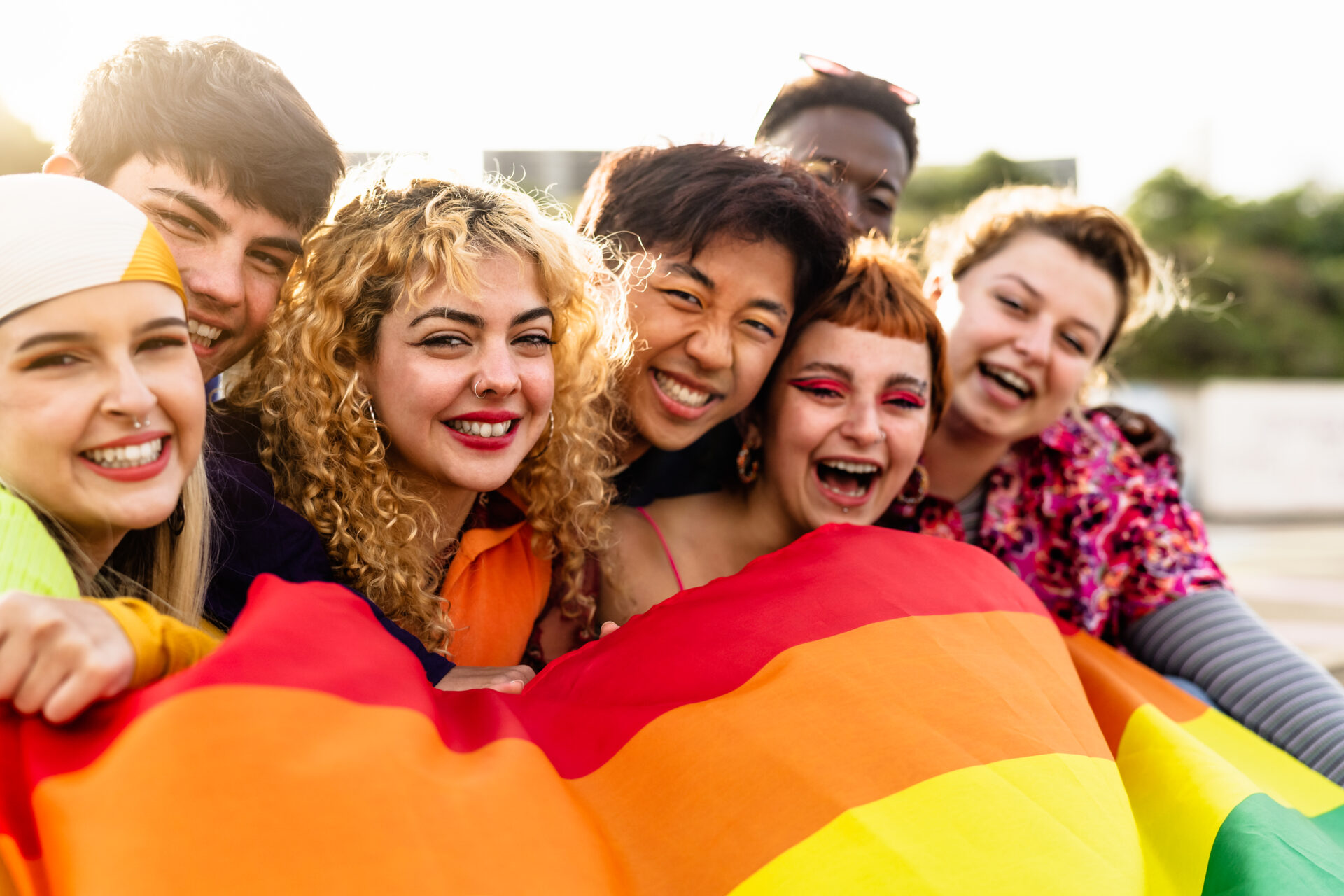
Diverse group of young friends celebrating at a gay pride festival.
Photo by biasciolialessandro
I am left-handed
I am left-handed.
I came out as left-handed early on in my childhood. Slowly, I realized that I was different from many of my classmates. They wrote using their right hand, which I found uncomfortable and unnatural, but couldn’t figure out why. Some of my friends and I bonded over being left-handed, which was not seen as a bad thing – just different.
Coming out as left-handed did change my life, though. The use of certain pencils and pens always resulted in smudges or a dirty left hand. Scissors were difficult to maneuver and were uncomfortable. Writing anything in public always resulted in a comment about how I was left-handed – especially if the other person was as well – which automatically made me a new friend, every time. I was different, but still accepted.
I was, however, an outlier. When I came out as left-handed, perceptions of left-handedness were just that I used a different hand to write, not that I was damaged or ill in some way. I stood on the shoulders of those who fought for left-handed inclusion and was encouraged simply to navigate and live in a right-handed world, rather than change who I was or live a life of shame.
Yes, there are shoulders to stand on in the left-handed fight for justice. Historically, being left-handed only recently faded from our collective perceptions of dysfunction. In French, the word that signifies right implies “upright” and “honorable”, while the word for left means “awkward” or “clumsy.”[i] Language conveys the deepest values in a culture, after all.
In the nineteenth century, left-handedness was at a historic low, with precedence only being around 4% of the population. I.C. McManus offers a theoretical explanation for this phenomenon, which is that “social pressures to convert left-handers to right-handers may change their observed handedness but they still retain the left-handed alleles as part of their genotype.” He continues by noting “left-handers were ostracized during the nineteenth century for various reasons causing a drop in the number of offspring of left-handers and a decrease in gene frequency.”[ii]
In other words, social pressures may change and influence how we present, but they cannot change who we are.
When I came out as left-handed, perceptions of left-handedness were just that I used a different hand to write, not that I was damaged or ill in some way. I stood on the shoulders of those who fought for left-handed inclusion and was encouraged simply to navigate and live in a right-handed world, rather than change who I was or live a life of shame.
From the moment we begin to grow and develop in the womb, we are growing into the image of God from which we were created. Deeply woven within us are the unique features that God intended for us to have that reflect back the richly diverse love that God has created us with. After being born, however, those traits are judged for their worth and value that they have in society so that we can ensure our children are effective in the fight for wealth and power.
Is an expectation to conform to a subset of characteristics unique to a particular worldview for an assumed benefit over others not an unrealistic expectation to place on a child? How can we expect a child to grow and flourish when they are restricted from the start? How can we assume that the ability to change and repress a God-given gift is even within our human abilities?
The reality for the LGBTQ+ youth of today is vastly similar to the left-handed youth of the nineteenth century. It is possible, perhaps, that parents then felt that they were forcing their children to be right-handed out of love – after all, writing was a primary form of communication at the time, and having difficulty in doing so could hinder the child in making progress in the larger society. This “love” comes at the price of a God-given gift that is assumed to be inherently clumsy or awkward, and has often been coupled tightly with physical abuse.
Love that comes at a price is not the love that we have been given and is not the love that Christ has taught us to give. Love that takes the form of repression is based in a fear that can only be passed on as hate and rejection rather than welcome and affirmation. True love for our brothers and sisters cannot be learned in a way that involves rejection of any part of our own selves.
We are at a crucial crossroads for our youth. It should be no surprise that mental health is a foremost concern for our youth in a world that tells them what they’ve felt since they were a child is not just wrong but even illegal. There are struggles that are inherent to growing up different: finding a true identity, finding a partner, navigating traditional gender and sexual norms, etc. These struggles are intensely difficult and have no need to be exacerbated by a fear- and intrinsic value-based worldview.
It is a right-handed world, and every smudge that I make or pair of scissors I fumble is the price I pay for living in it. Likewise, our youth will make mistakes and fumble all sorts of things on the journey of living in a world that takes all that we can give. Let’s not make it harder for them.
Kurt Kaufman is communications coordinator, Association of Welcoming & Affirming Baptists, ministerial associate, First Baptist Church of Denver, Denver, CO, and an MDiv student at Central Seminary, Shawnee, KS.
The views expressed are those of the author and not necessarily those of American Baptist Home Mission Societies.



